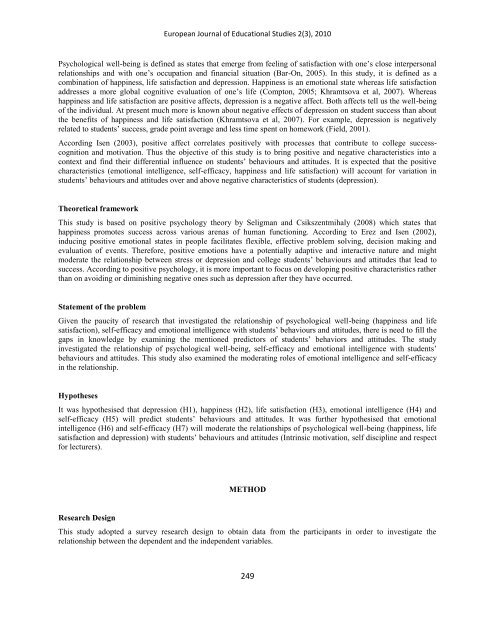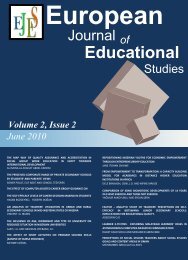emotional intelligence, self-efficacy, psychological well-being and ...
emotional intelligence, self-efficacy, psychological well-being and ...
emotional intelligence, self-efficacy, psychological well-being and ...
You also want an ePaper? Increase the reach of your titles
YUMPU automatically turns print PDFs into web optimized ePapers that Google loves.
European Journal of Educational Studies 2(3), 2010<br />
Psychological <strong>well</strong>-<strong>being</strong> is defined as states that emerge from feeling of satisfaction with one’s close interpersonal<br />
relationships <strong>and</strong> with one’s occupation <strong>and</strong> financial situation (Bar-On, 2005). In this study, it is defined as a<br />
combination of happiness, life satisfaction <strong>and</strong> depression. Happiness is an <strong>emotional</strong> state whereas life satisfaction<br />
addresses a more global cognitive evaluation of one’s life (Compton, 2005; Khramtsova et al, 2007). Whereas<br />
happiness <strong>and</strong> life satisfaction are positive affects, depression is a negative affect. Both affects tell us the <strong>well</strong>-<strong>being</strong><br />
of the individual. At present much more is known about negative effects of depression on student success than about<br />
the benefits of happiness <strong>and</strong> life satisfaction (Khramtsova et al, 2007). For example, depression is negatively<br />
related to students’ success, grade point average <strong>and</strong> less time spent on homework (Field, 2001).<br />
According Isen (2003), positive affect correlates positively with processes that contribute to college successcognition<br />
<strong>and</strong> motivation. Thus the objective of this study is to bring positive <strong>and</strong> negative characteristics into a<br />
context <strong>and</strong> find their differential influence on students’ behaviours <strong>and</strong> attitudes. It is expected that the positive<br />
characteristics (<strong>emotional</strong> <strong>intelligence</strong>, <strong>self</strong>-<strong>efficacy</strong>, happiness <strong>and</strong> life satisfaction) will account for variation in<br />
students’ behaviours <strong>and</strong> attitudes over <strong>and</strong> above negative characteristics of students (depression).<br />
Theoretical framework<br />
This study is based on positive psychology theory by Seligman <strong>and</strong> Csikszentmihaly (2008) which states that<br />
happiness promotes success across various arenas of human functioning. According to Erez <strong>and</strong> Isen (2002),<br />
inducing positive <strong>emotional</strong> states in people facilitates flexible, effective problem solving, decision making <strong>and</strong><br />
evaluation of events. Therefore, positive emotions have a potentially adaptive <strong>and</strong> interactive nature <strong>and</strong> might<br />
moderate the relationship between stress or depression <strong>and</strong> college students’ behaviours <strong>and</strong> attitudes that lead to<br />
success. According to positive psychology, it is more important to focus on developing positive characteristics rather<br />
than on avoiding or diminishing negative ones such as depression after they have occurred.<br />
Statement of the problem<br />
Given the paucity of research that investigated the relationship of <strong>psychological</strong> <strong>well</strong>-<strong>being</strong> (happiness <strong>and</strong> life<br />
satisfaction), <strong>self</strong>-<strong>efficacy</strong> <strong>and</strong> <strong>emotional</strong> <strong>intelligence</strong> with students’ behaviours <strong>and</strong> attitudes, there is need to fill the<br />
gaps in knowledge by examining the mentioned predictors of students’ behaviors <strong>and</strong> attitudes. The study<br />
investigated the relationship of <strong>psychological</strong> <strong>well</strong>-<strong>being</strong>, <strong>self</strong>-<strong>efficacy</strong> <strong>and</strong> <strong>emotional</strong> <strong>intelligence</strong> with students’<br />
behaviours <strong>and</strong> attitudes. This study also examined the moderating roles of <strong>emotional</strong> <strong>intelligence</strong> <strong>and</strong> <strong>self</strong>-<strong>efficacy</strong><br />
in the relationship.<br />
Hypotheses<br />
It was hypothesised that depression (H1), happiness (H2), life satisfaction (H3), <strong>emotional</strong> <strong>intelligence</strong> (H4) <strong>and</strong><br />
<strong>self</strong>-<strong>efficacy</strong> (H5) will predict students’ behaviours <strong>and</strong> attitudes. It was further hypothesised that <strong>emotional</strong><br />
<strong>intelligence</strong> (H6) <strong>and</strong> <strong>self</strong>-<strong>efficacy</strong> (H7) will moderate the relationships of <strong>psychological</strong> <strong>well</strong>-<strong>being</strong> (happiness, life<br />
satisfaction <strong>and</strong> depression) with students’ behaviours <strong>and</strong> attitudes (Intrinsic motivation, <strong>self</strong> discipline <strong>and</strong> respect<br />
for lecturers).<br />
METHOD<br />
Research Design<br />
This study adopted a survey research design to obtain data from the participants in order to investigate the<br />
relationship between the dependent <strong>and</strong> the independent variables.<br />
249

















